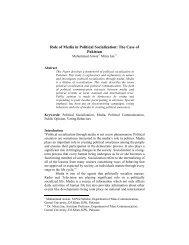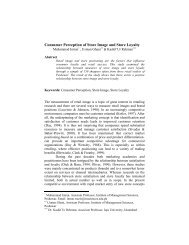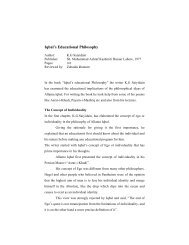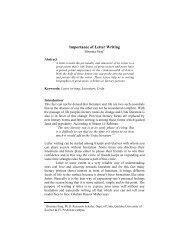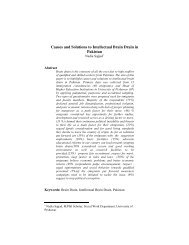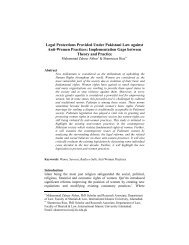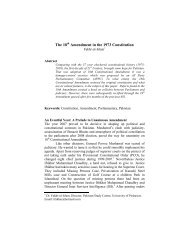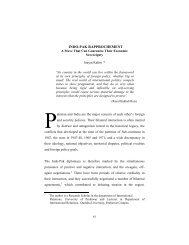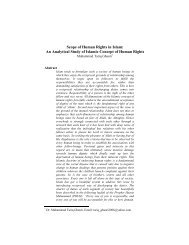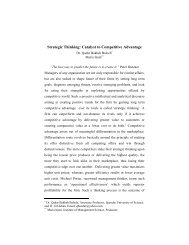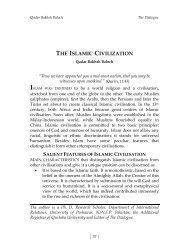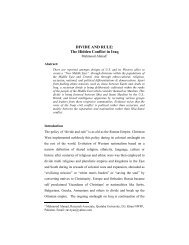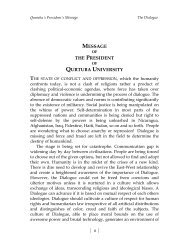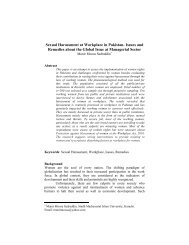COLD WAR POLITICS OF SUPERPOWERS IN SOUTH ASIA Abstract
COLD WAR POLITICS OF SUPERPOWERS IN SOUTH ASIA Abstract
COLD WAR POLITICS OF SUPERPOWERS IN SOUTH ASIA Abstract
You also want an ePaper? Increase the reach of your titles
YUMPU automatically turns print PDFs into web optimized ePapers that Google loves.
End Notes<br />
1 . Dr. A. Z. Hilali is a Professor of International Relations in the Department of Political<br />
Science at the University of Peshawar (NWFP), Peshawar, Pakistan.<br />
azahilali@yahoo.co.uk<br />
2<br />
3<br />
4<br />
5<br />
6<br />
7<br />
8<br />
9<br />
10<br />
11<br />
12<br />
13<br />
14<br />
15<br />
Kim Beazley and Ian Clark, The Politics of Intrusion: The Superpowers and the<br />
Indian Ocean (Sydney: Alternative Publishing Cooperative, 1979), pp. 6-23.<br />
See W. H. Parker, Mackinder: Geography as an Aid to Statecraft (Oxford:<br />
Clarendon Press, 1982), pp. 32-56.<br />
Thomas P. Thornton, “The United States and South Asia,” Survival, Vol. 35, No. 2<br />
(Summer 1993), pp. 110; and see S. D. Muni, “The United States and South Asia:<br />
The Strategic Dimension,” in Shelton U. Kodikara (ed.)., External Compulsions of<br />
South Asian Politics (London: Sage Publications, 1993), p. 58.<br />
Olaf Caroe, Wells of Power (London: Macmillan, 1951), p.42.<br />
Rais Ahmad Khan, “Peace and Security in South Asia: The American Role,”<br />
Pakistan Journal of American Studies, Vol. 1, No. 1 & 2, 1983, p. 10; Stephen P.<br />
Cohen, “Superpower Cooperation in South Asia,” in Roger E. Kanet and Edward A.<br />
Kolodziej (ed.)., The Cold War As Cooperation: Superpower Cooperation in<br />
Regional Conflict Management (London: Macmillan Press, 1991), pp. 281-293.<br />
Robin Higham, Intervention or Abstention: The Dilemma of American Foreign<br />
Policy (Kentucky: The Kentucky University Press, 1975), p.202.<br />
Mahmud A. Faksh, “US Policy in the Middle East: Incongruity in Political Strategy<br />
and Action,” American Arab Affairs, Vol. 2, No. 1 (Winter 1987-88), p. 38.<br />
Joseph J. Malone, “American and the Arabian Peninsula: The First Two Hundred<br />
Years,” Middle East Journal (Summer 1976), pp. 406-24.<br />
See for more study about the US policy toward the countries of South Asia Norman<br />
D. Palmer, South Asia and United States Foreign Policy (New York: Houghton<br />
Mifflin, 1966); W. Norman Brown, The United States and India, Pakistan,<br />
Bangladesh (3rd ed.)., (Cambridge: Harvard University Press, 1972); and Werner<br />
Levi, The Challenge of World Politics in South and Southeast Asia (Englewood<br />
Cliffs, N. J.: Prentice-Hall, 1968).<br />
US Department of State, Bulletin (23 March 1947), pp. 536-547.<br />
Ibid.<br />
“The Sources of Soviet Conduct,” Foreign Affairs, Vol. 25, No. 4 (July 1947), p.<br />
576; and see US Department of State, Bulletin (22 March 1954), p. 445; and see<br />
Chester Bowles, “A US Policy for Asia,” New Leader (22 February 1954), p. 4.<br />
Report by the Foreign Relation Committee to South, Southeast and West Asia about<br />
the emerging situation of India, Pakistan and Iran. See The State Department,<br />
Bulletin, 3 April 1950 (Washington, D. C: Government Printing Office, 1950), pp.<br />
134-56; and see also R. K. Jain, US-South Asia Relations 1947-1982, Vol. II, (New<br />
Delhi: Radiant, 1983), p.16.<br />
US Congress, House, Committee on Foreign Affairs, United States Policy Toward<br />
Asia, Hearing before the Subcommittee on the Far East and Pacific, 89 th Congress.,<br />
2 nd Session, 1966, pp. 80-81; and see Charles Wolf. Jr, United States Policy and the<br />
Third World: Problems and Analysis (Boston: Little Brown & Co, 1967), pp. 21-22.<br />
The American foreign policy has been anti-communist hardly needs substantiation.<br />
In this regard, the large number of statements using the anti-communist rationale to<br />
justify American policy in South Asia and specifically the alliance with Pakistan.<br />
See US President Public Papers of the Presidents of the United States (Washington,<br />
D.C: Office of the Federal Registrar, National Archives and Records Service, 1953);<br />
Dwight David Eisenhower, 1959, p. 362; US Congress , House Committee on<br />
103



